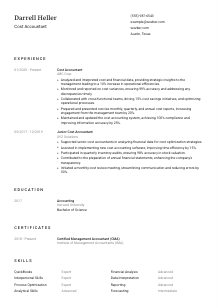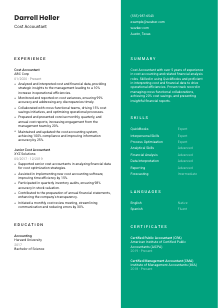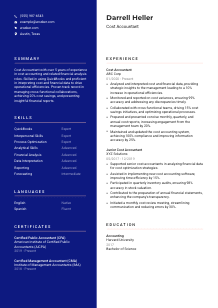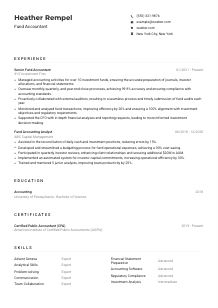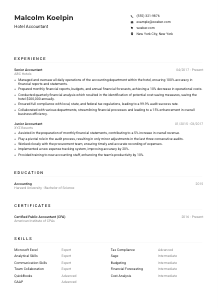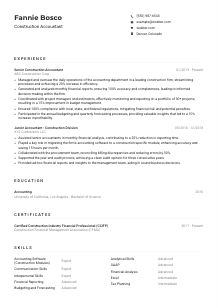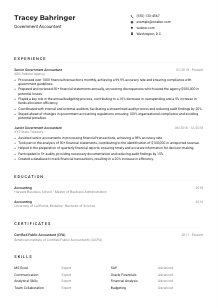Cost Accountant Resume Example
Balancing ledgers, but your resume seems unaccounted for? Delve into this Cost Accountant resume example, crafted with Wozber free resume builder. It reveals how efficiently you can align your fiscal finessing with job specifications, ensuring your career trajectory always adds up to success!
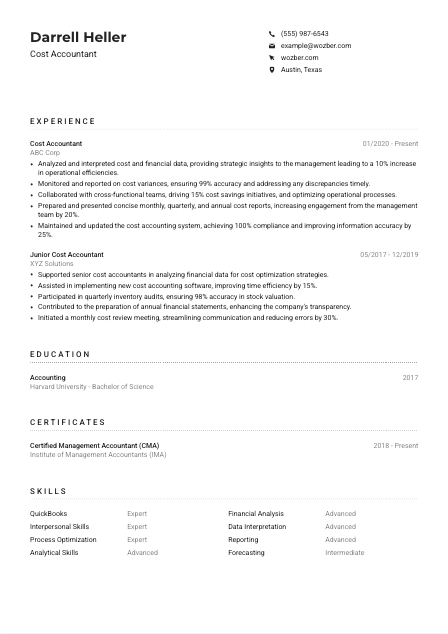
How to write a Cost Accountant Resume?
Welcome, aspiring Cost Accountant! In a world where balancing books and analyzing costs is your forte, ensuring your resume precisely mirrors these skills is paramount. With an eye for detail and the right tools, such as Wozber's free resume builder, creating an ATS-compliant resume that stands out in the crowd is within reach.
Imagine crafting a resume that not only speaks volumes about your professional prowess but also sails smoothly through Applicant Tracking Systems (ATS). Let's embark on a journey to build a resume that showcases your expertise in cost accounting and lands you your dream job in this competitive field.
Personal Details
The Personal Details section is like the cover of your professional book. It's the first thing hiring managers see, and it sets the stage for the narrative of your career. Here's how you can polish it to shine bright:
1. Name That Brands
Your name is your professional headline. Make it stand out with a clear, professional font at the top of your resume. This isn't just typography; it's your personal brand, ensuring you're remembered.
2. Job Title Alignment
Immediately below your name, tailor your title to the job you're applying for. "Cost Accountant" isn't just a job title; it's a declaration of your professional expertise. This small touch aligns you with the job from the get-go.
3. Contact Essentials
List your phone number and a professional email address using the firstname.lastname format. Mistakes here are costly, so double-check for accuracy. This simple yet crucial information bridges the gap between you and your next opportunity.
4. Location Matters
"Austin, Texas" isn't just where you are; it's a strategic match to the job's geographic requirements. This detail emphasizes your availability and readiness, minimizing any concerns about relocation.
5. Digital Presence
Including a LinkedIn profile or a professional website gives a multidimensional view of your professional life. Ensure these are updated and reflect your resume, extending an invitation to explore your career depth.
Takeaway
Think of the Personal Details section as your professional handshake: warm, inviting, and assured. It's your first opportunity to convey reliability and confidence. Pay attention to these details, and you're already on your way to making a memorable first impression.





Experience
In the world of Cost Accounting, your experience speaks volumes about your capabilities. This section is more than a timeline; it's a narrative of your professional journey. Let's make sure it tells a compelling story.
- Analyzed and interpreted cost and financial data, providing strategic insights to the management leading to a 10% increase in operational efficiencies.
- Monitored and reported on cost variances, ensuring 99% accuracy and addressing any discrepancies timely.
- Collaborated with cross‑functional teams, driving 15% cost savings initiatives, and optimizing operational processes.
- Prepared and presented concise monthly, quarterly, and annual cost reports, increasing engagement from the management team by 20%.
- Maintained and updated the cost accounting system, achieving 100% compliance and improving information accuracy by 25%.
- Supported senior cost accountants in analyzing financial data for cost optimization strategies.
- Assisted in implementing new cost accounting software, improving time efficiency by 15%.
- Participated in quarterly inventory audits, ensuring 98% accuracy in stock valuation.
- Contributed to the preparation of annual financial statements, enhancing the company's transparency.
- Initiated a monthly cost review meeting, streamlining communication and reducing errors by 30%.
1. Dissecting the Job Description
Start by meticulously mapping your experiences against the job requirements. Analyzing costs, financial forecasting, and reporting aren't just tasks; they're your battlegrounds where you've thrived and excelled.
2. Job Titles and Companies
Structure is key. List your roles beginning with the most recent, but don't just stop there. Dive into the essence of each position, presenting not just a title, but a chapter of your professional story.
3. Achievement-Focused Statements
Each bullet point should be a beacon of your achievements. Did you increase operational efficiency by 10%? Those numbers narrate a story of success, contribution, and tangible impact.
4. Quantify Your Impact
Quantification isn't just for balance sheets; it's for your resume too. Presenting your achievements with numbers adds weight and credibility, turning abstract duties into measurable successes.
5. Relevance is Key
While it's tempting to list every professional conquest, focus on what's most relevant to cost accounting. This strategic selection ensures every line on your resume resonates with your target role.
Takeaway
The Experience section is where your professional narrative unfolds. It's a showcase of your growth, achievements, and the value you've brought to previous roles. Tailor it to reflect your readiness and fit for the Cost Accountant role. Remember, you're not just listing your past jobs; you're telling the story of a successful Cost Accounting professional ready for the next challenge.
Education
In the realm of Cost Accounting, your educational foundation supports your practical expertise. This section, while seemingly straightforward, reinforces your credentials and alignment with the role's requirements.
1. Highlight Key Degrees
A Bachelor's degree in Accounting, Finance, or a related field isn't just a criterion; it's the bedrock of your knowledge. Ensure this is prominently listed, clearly aligning with the job's foundational requirements.
2. Clear Structure
Organization is as crucial here as it is in a ledger. Present your educational journey in a clean, easy-to-skim format. This clarity mirrors the precision you bring to your professional role.
3. Degree Specifications
Tailor the presentation of your degree to reflect the job posting. This isn't just about meeting requirements; it's about showcasing your focused education in cost accounting and related fields.
4. Relevant Coursework
If you're early in your career, highlighting pertinent courses can underline your specialized knowledge and eagerness to grow within this niche. This detail shows your commitment to the field beyond the basics.
5. Additional Achievements
Did you excel academically or participate in relevant extracurricular activities? These highlights demonstrate your dedication and passion for accounting beyond the classroom, offering a glimpse into your initiative and drive.
Takeaway
Your educational background sets the stage for your professional expertise. It's a testament to your commitment to the field of Cost Accounting. By articulating this section with care, you lay a solid foundation that supports your candidacy, showcasing not just qualifications, but a trajectory of growth and learning.
Certificates
In the ever-evolving field of Cost Accounting, staying updated is not just recommended; it's essential. Certifications act as a beacon of your continuous learning and expertise.
1. Match with Job Requirements
The job description mentions the CMA certification as a plus. If you possess it, or any relevant certification, it's not just an addition; it's a gold star on your resume. This demonstrates your commitment and specialist knowledge.
2. Selective Listing
While you might have a collection of certifications, prioritize those relevant to cost accounting. This ensures the hiring manager immediately sees the depth of your commitment and expertise in the field.
3. Validity Dates
For certifications like the CMA, indicating the validity period highlights your current competency and dedication to maintaining professional standards. This detail speaks volumes about your professional ethics.
4. Stay Proactively Certified
The field of Cost Accounting is dynamic. Regularly updating your certifications and seeking new ones aligned with industry trends showcases your proactive stance in nurturing your career and expertise.
Takeaway
Certifications are badges of honor, marking the milestones of your professional development in Cost Accounting. They reflect not just where you've been, but your commitment to staying at the forefront of the field. Highlight them with pride and intention, for they tell a story of continuous learning and unwavering dedication.
Skills
In the meticulous world of Cost Accounting, your skills are the tools of your trade. This section isn't just a list; it's a carefully curated showcase of your professional toolkit, ready to tackle any financial quandary.
1. Extract from Job Description
Start with a deep dive into the job description. Identify both the stated and implied skills required, especially those pertaining to cost analysis, software proficiency, and financial forecasting. These aren't mere words; they encapsulate the essence of what makes a great Cost Accountant.
2. Tailored Skills Listing
Reflect on your own skill set and align it with the job requirements. For instance, proficiency in QuickBooks isn't just a skill; it's a testament to your ability to navigate and extract critical financial insights from software, a fundamental requirement for a Cost Accountant.
3. Organized and Focused
Resist the urge to list every skill you possess. Focus on those most relevant to cost accounting, presenting them in an organized manner. This prioritization ensures that each skill listed is a building block, contributing to the profile of a proficient Cost Accountant.
Takeaway
Your skills section is a testament to your mastery in the field of Cost Accounting. It goes beyond mere proficiency; it's a declaration of your readiness to tackle financial challenges with acumen and insight. Present your skills with clarity and purpose, and watch as they paint the picture of a dynamic, indispensable professional.
Languages
In the globalized arena of finance, the ability to communicate across linguistic barriers is an invaluable asset. Let the Languages section of your resume reflect your ability to navigate diverse environments.
1. Check Job Requirements
Start by reviewing the job posting for any language specifications. While the primary language for our example is English, additional languages can showcase your ability to thrive in multicultural settings.
2. Prioritize Job-Relevant Languages
English takes center stage, as specified by the job requirements. Highlighting your proficiency in English, be it native or fluent, immediately aligns with the expectations.
3. Include Additional Languages
Mentioning other languages you're fluent in, like Spanish, presents you as a versatile candidate, capable of contributing to internationally diverse teams. This adds another layer of appeal to your professional profile.
4. Honest Proficiency Levels
Clearly delineate your language proficiency levels. Honesty here ensures there are no surprises down the line, and it sets a tone of integrity and transparency.
5. Tailor to Job's Scope
Consider the broader scope of the role. For a position that involves liaising with international clients or offices, highlighting your multilingual abilities could position you as a particularly attractive candidate.
Takeaway
Your linguistic skills are more than just personal attributes; they are professional tools that enable you to bridge gaps and build connections in a global marketplace. Flaunt your language proficiencies proudly on your resume, for they embellish your candidacy with a palette of communicative colors, making you a more adaptable and appealing candidate for any Cost Accountant role.
Summary
The Summary section is your moment to shine, to encapsulate your professional identity in a few powerful sentences. This is where you weave together your experience, skills, and unique value proposition into a compelling narrative.
1. Decipher the Job Essence
Begin by absorbing the soul of the job description. Understand the nuances and expectations embedded within the role of a Cost Accountant. This understanding sets the foundation for a summary that resonates with hiring managers.
2. Start With Your Identity
Introduce yourself as a professional. "Cost Accountant with over 5 years of experience" isn't just a statement; it's an opening line that grabs attention, setting the stage for your narrative.
3. Highlight Your Specialty
Enumerate your special skills and achievements, especially those that align with the job's outline. Mention your proficiency in QuickBooks and your knack for driving operational efficiencies, showcasing you as a perfect fit for the role.
4. Conciseness Is Key
While it's tempting to detail every achievement, the summary is not the place. Keep it punchy and potent, focusing on the essence of what makes you the ideal candidate for the Cost Accountant position.
Takeaway
The summary section is your handshake, your promise, and your invitation for the hiring manager to delve deeper into your resume. It's where you assert, confidently and concisely, that you're not just a candidate, but the candidate for the Cost Accountant position. Draft it with care, infuse it with your unique essence, and let it resonate with your future employer.
Embarking on Your Cost Accountant Quest
Congratulations on navigating through the intricacies of crafting a standout Cost Accountant resume! With these tailored tips, Wozber's free resume builder at your disposal, and a sprinkle of your professional finesse, you're now equipped to create an ATS-compliant resume that not only reflects your expertise but also captivates hiring managers. Your resume is the key that unlocks doors to exciting opportunities. Sharpen it with precision, present it with confidence, and step into the world ready to leave your mark as a Cost Accountant par excellence.
The ledger of your career is poised for its next significant entry. Go forth and chart a path to success!

- Bachelor's degree in Accounting, Finance, or a related field.
- Minimum of 3 years of experience in cost accounting or related financial analysis roles.
- Proficiency in using accounting software such as QuickBooks or similar tools.
- Strong analytical, organizational, and interpersonal skills.
- Certified Management Accountant (CMA) or relevant professional certification is a plus.
- Ability to operate in an English-speaking work environment.
- Must be located in or willing to relocate to Austin, Texas.
- Analyze and interpret cost and financial data to provide strategic insights to management.
- Monitor and report on cost variances, ensuring accuracy and addressing any discrepancies.
- Collaborate with cross-functional teams to drive cost savings initiatives and operational efficiencies.
- Prepare and present monthly, quarterly, and annual cost reports and forecasts.
- Maintain and update the cost accounting system to ensure compliance and accuracy of information.





